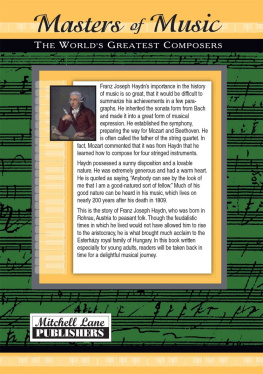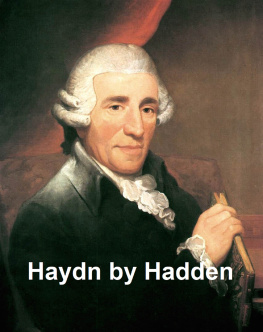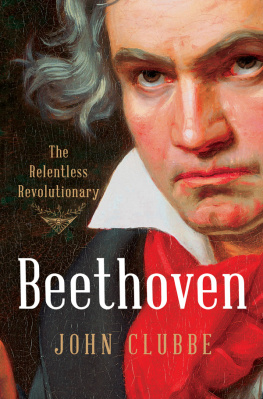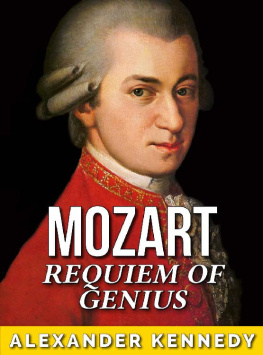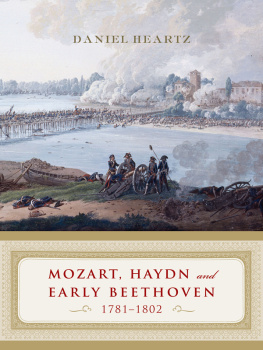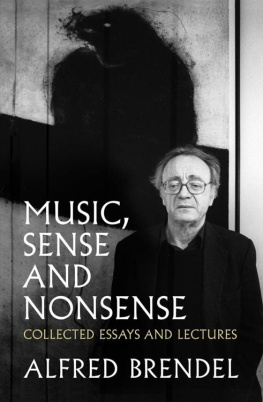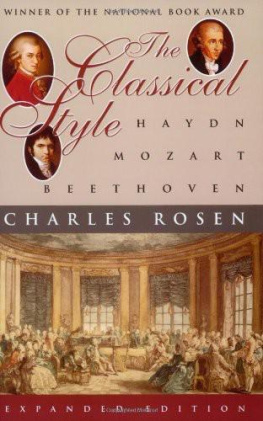

Titles in the Series
The Life and Times of...
Johann Sebastian Bach
Ludwig van Beethoven
Irving Berlin
Hector Berlioz
Leonard Bernstein
Johannes Brahms
Frederic Chopin
Duke Ellington
Stephen Foster
George Gershwin
William Gilbert and Arthur Sullivan
George Frideric Handel
Franz Joseph Haydn
Scott Joplin
Franz Liszt
Felix Mendelssohn
Wolfgang Amadeus Mozart
Franz Peter Schubert
John Philip Sousa
Igor Stravinsky
Peter Ilyich Tchaikovsky
Giuseppe Verdi
Antonio Lucio Vivaldi
Richard Wagner
Visit us on the web: www.mitchelllane.com
Comments? email us:

Copyright 2004 by Mitchell Lane Publishers, Inc. All rights reserved. No part of this book may be reproduced without written permission from the publisher. Printed and bound in the United States of America.
Printing 4 5 6 7 8
Library of Congress Cataloging-in-Publication Data
Zannos, Susan.
Franz Joseph Haydn/Susan Zannos.
p. cm. (Masters of Music. The worlds greatest composers)
Summary: Discusses the life and career of the eighteenth century Austrian composer.
Includes bibliographical references (p.) and index.
ISBN 1-58415-193-5
1. Haydn, Joseph, 1732-1809Juvenile literature. 2. ComposersAustriaBiographyJuvenile literature. [1. Haydn, Joseph, 1732-1809. 2. Composers.] I Title. II. Series.
ML3930.H3 Z36 2003
780.92dc21
2002153348
ISBN 13: 9781584151937
eISBN: 978-1-5457-4881-7
ABOUT THE AUTHOR: Susan Zannos has been a lifelong educator, having taught at all levels, from preschool to college, in Mexico, Greece, Italy, Russia, and Lithuania, as well as in the United States. She has published a mystery Trust the Liar (Walker and Co.) and Human Types: Essence and the Enneagram (Samuel Weiser). Her book, Human Types, was recently translated into Russian, and in 2003 Susan was invited to tour Russia and lecture about her book. Another book she wrote for young adults, Careers in Education (Mitchell Lane) was selected for the New York Public Librarys Books for the Teen Age 2003 List. She has written many books for children, including Chester Carlson and the Development of Xerography and The Life and Times of Ludwig van Beethoven (Mitchell Lane). Her great interest in classical composers inspired her to write this book. When not traveling, Susan lives in the Sierra Foothills of Northern California.
PHOTO CREDITS: Cover: Photo Researchers; p. 6 Photo Researchers; p. 9 Corbis; p. 10 Archivo Iconografico; p. 12 Austrian Archives/Corbis; p. 14 Hulton/Archive; p. 17 Austrian Archives/Corbis; p. 18 Stephanie Kondrchek; p. 19 Ali Meyer/Corbis; p. 22 Archivo Iconografico/Corbis; p. 25 left and right: Corbis; p. 28 Corbis; p. 34 Photo Researchers; p. 37 Hulton/Archive; p. 38 SuperStock; p. 40 Bettmann/Corbis; p. 42 Bettmann/Corbis.
PUBLISHERS NOTE: This story is based on the authors extensive research, which she believes to be accurate. Documentation of this research can be found on page 46.
Sometimes, the spelling of names can differ through translation and you will find many variations in other published works. We have chosen the more Anglicized spelling of some names, such as Joseph (instead of Josef) and Nikolaus (instead of Mikls).
The internet sites referenced in this book were all active as of the publication date of this book. Because of the fleeting nature of some Web sites, the publisher cannot guarantee that they will all be active when you are reading this book.
PLB4
Contents
The Life and Times of
Franz Joseph Haydn
by Susan Zannos
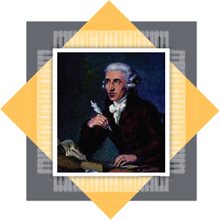
Chapter 1
Papa Haydn
Chapter 2
A Working Childhood
Chapter 3
Success Begins
Chapter 4
Musician
Chapter 5
Fame
* For Your Information

Franz Joseph Haydn has been called the father of the symphony. However, Haydn did not write the first symphony. He developed it from a short, simple form to a long form for a large orchestra. The combination of instruments that he used in his symphonies are the basis for todays symphony orchestra. This portrait of Haydn was done by Ludwig von Guttenbrunn.

Papa Haydn
F ranz Joseph Haydn (HY-den) was a musical genius. But he lived in a time when musicians were dependent on wealthy patrons for their very survival. In the 18th century much of the wealth and power in Europe was under the control of a few enormously rich families. These royal houses, such as the Bourbons in France, the Hapsburgs in Austria and the Romanovs in Russia, formed great dynasties supported by smaller kingdoms. Everyone elsepeasant farmers, craftsmen, tradesmen, artists, and minor nobilitydepended on these powerful princes for their livelihood. This was called the feudal system.
Haydn worked within this system. He spent much of his adult life employed by the Esterhzys, an immensely wealthy Hungarian family who owned estates near the Austrian border. The Esterhzy princes were music lovers who recognized and valued Haydns genius. Still, they treated him as a servant.
Haydns contract with the Esterhzys required him to present himself to the prince every day at noon to discuss musical plans for the day. The prince addressed his servants, Haydn included, in the third person. So he wouldnt ask, What have you composed for this evening? Instead he would say, What has Herr Haydn composed for this evening?
This method of address emphasized that Haydn was a member of the lower classes. He had to wear a uniform. He had to set an example for the other musicians by his good behavior. He had to resolve any problems that occurred among the musicians. He had to teach the singers and rehearse the orchestra. He had to take care of the musical instruments and the musical scores in the Esterhzys extensive music library. He couldnt even resign without securing the approval of the prince. And all of Haydns musical compositions were the property of Prince Esterhzy. No copies were to be made without the princes permission.
But instead of feeling bitter about all the work that was expected of him, Haydn was cheerful. He told his first biographer, Georg Griesinger, who spent the last 10 years of Haydns life as a close friend, My Prince was content with all my works, I received approval. I could, as head of an orchestra, make experiments, observe what enhanced an effect, and what weakened it, thus improving, adding to, cutting away, and running risks. I was set apart from the world, there was nobody in my vicinity to confuse and annoy me in my course, and so I had to be original.
Haydn had a sunny disposition that thrived on hard work, and a kindly nature that made him respected and admired by the musicians he worked with. They responded to his gentle discipline by doing their best for him. They were willing to come to rehearsal whenever Haydn had an experiment he wanted to try out. So they called him Papa Haydn even though he had no children.
Next page
